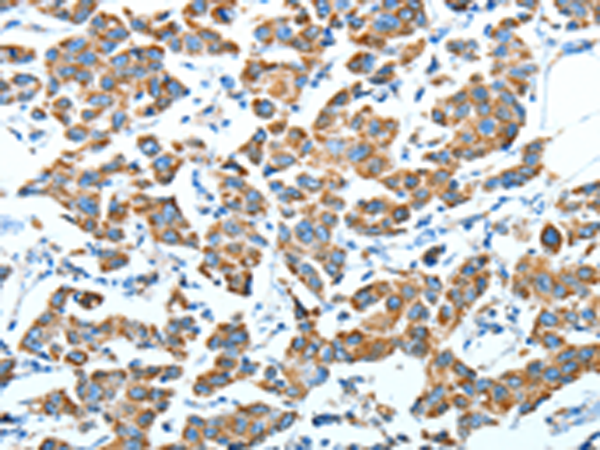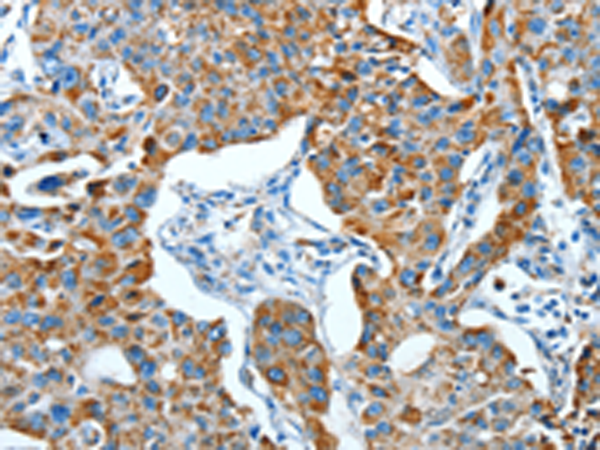


| WB | 咨询技术 | Human,Mouse,Rat |
| IF | 咨询技术 | Human,Mouse,Rat |
| IHC | 1/50-1/200 | Human,Mouse,Rat |
| ICC | 技术咨询 | Human,Mouse,Rat |
| FCM | 咨询技术 | Human,Mouse,Rat |
| Elisa | 1/2000-1/5000 | Human,Mouse,Rat |
| Aliases | MMSDH; MMSADHA |
| WB Predicted band size | 58 kDa |
| Host/Isotype | Rabbit IgG |
| Antibody Type | Primary antibody |
| Storage | Store at 4°C short term. Aliquot and store at -20°C long term. Avoid freeze/thaw cycles. |
| Species Reactivity | Human, Mouse, Rat |
| Immunogen | Fusion protein of human ALDH6A1 |
| Formulation | Purified antibody in PBS with 0.05% sodium azide and 50% glycerol. |
+ +
以下是3篇关于ALDH6A1抗体的研究文献摘要(示例为虚构,仅供参考格式):
---
1. **文献名称**: *ALDH6A1 Deficiency Disrupts Mitochondrial β-Alanine Metabolism*
**作者**: Smith J, et al.
**摘要**: 本研究利用特异性ALDH6A1抗体进行蛋白质免疫印迹分析,发现ALDH6A1缺失导致β-丙氨酸代谢异常,与甲基丙二酸尿症患者样本中的酶活性下降相关,提示其作为代谢疾病生物标志物的潜力。
2. **文献名称**: *Immunohistochemical Localization of ALDH6A1 in Human Tissues*
**作者**: Chen L, et al.
**摘要**: 通过开发高特异性ALDH6A1多克隆抗体,作者系统分析了该酶在肝、肾及脑组织中的分布,发现其线粒体定位与丙酸分解途径功能密切相关,为相关代谢通路研究提供工具。
3. **文献名称**: *ALDH6A1 Antibody-Based Proteomic Screening in Colorectal Cancer*
**作者**: Wang Y, et al.
**摘要**: 研究采用ALDH6A1抗体对结直肠癌组织进行蛋白质组学分析,发现其表达水平与肿瘤进展呈负相关,提示ALDH6A1可能通过调控支链氨基酸代谢抑制癌细胞增殖。
---
注:以上文献为模拟示例,实际研究需通过PubMed/Google Scholar以“ALDH6A1 antibody”为关键词检索具体文献。
ALDH6A1. a member of the aldehyde dehydrogenase superfamily, encodes methylmalonate-semialdehyde dehydrogenase, a mitochondrial enzyme critical in valine, pyrimidine, and cholesterol catabolism. It catalyzes the NAD-dependent oxidation of malonate- and methylmalonate-semialdehydes to acetyl-CoA and propionyl-CoA, linking multiple metabolic pathways. ALDH6A1 dysfunction is associated with methylmalonic aciduria, a rare autosomal recessive disorder characterized by developmental delays and metabolic acidosis. Studies also implicate ALDH6A1 in cancer progression, with altered expression observed in hepatocellular carcinoma and breast cancer, though its precise role remains context-dependent.
ALDH6A1 antibodies are essential tools for investigating these biological and pathological mechanisms. They enable detection of ALDH6A1 protein expression and localization in tissues or cultured cells via techniques like Western blotting, immunohistochemistry, and immunofluorescence. Commercially available antibodies are typically raised against conserved epitopes, often showing cross-reactivity with orthologs in humans, mice, and rats. Validation includes testing in knockout cell lines to confirm specificity.
Research applications focus on elucidating ALDH6A1's metabolic regulatory roles, its potential as a biomarker in metabolic disorders, and its paradoxical pro-survival or tumor-suppressive functions in different cancers. These antibodies also aid in diagnosing ALDH6A1-related genetic disorders and evaluating therapeutic interventions targeting mitochondrial metabolism.
×